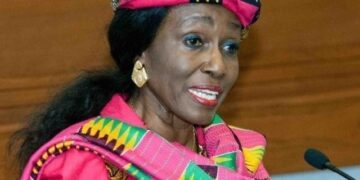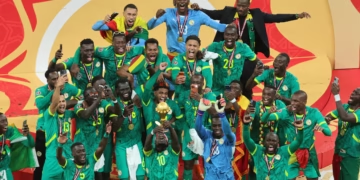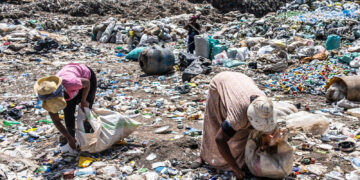ACCRA, Sept 30 (The African Portal) – A young woman at Mfantseman municipality in the Central Region of Ghana says her life was shattered after being raped by a close relative during her Senior High School years. This happened some 14 years ago. At 16, Anita (not her real name) was preparing for her second-term examinations when her life changed forever. She was raped by her grandmother’s younger brother, a 49-year-old miner who had returned home sick at the time. In this account, he will be referred to as Akwasi.
Anita recalls that she had been asked to deliver food to him. “When I went to serve him, he told me to drop the food on the table in his room,” she said. Naïve of the danger ahead, she walked inside. Akwasi followed, forced her onto his bed and raped her. Crying and in pain, Anita reported the ordeal to her grandmother. Instead of seeking justice, her grandmother gave her money for some medication and warned her not to tell anyone. She later confronted her brother, who denied the assault.
Although Akwasi is now deceased, the attack left lasting consequences on Anita. The incident remained a secret between her and her grandmother, who has also since passed away. Anita only realised the full impact after completing school. Despite the ordeal, she excelled in her exams, but during a medical screening for further studies, doctors diagnosed her with a serious illness.
“The news broke me down so much that for some months I couldn’t eat well. I lost interest in almost everything. I almost ignored school,” she said.
She added, “I am scared that many young girls are going through my condition with no voice, no help and no hope for recovery.”
Rights groups warn that sexual violence remains widespread in Ghana and across Africa, with many cases going unreported due to stigma, fear and family silence.
Staggering records
The United Nations Children’s agency says one in eight girls and young women across the world have endured rape and sexual violence, with the highest number of victims recorded in sub-Saharan Africa.
UNICEF published its first-ever global estimate on sexual violence against children, revealing that 79 million girls – one in five – in sub-Saharan countries hit by conflict and insecurity had experienced sexual assault or rape before turning 18.
“It’s terrifying,” said Nankali Maksud, a child violence specialist at UNICEF based in Nairobi, Kenya. “It is generations of trauma.”
Girls who had suffered the trauma of sexual abuse were often unable to learn at school, she said.
In March 2019, the Daily Trust newspaper published a story titled “Abuja communities where girls are raped en route school” (March 31), highlighting how fear of sexual violence was forcing many girls out of school in parts of Nigeria’s capital.
The report recounted the case of Maimuna, whose dream of an education ended in February 2018 when she was attacked and raped by two men while returning home to Zhiko from Ijagbagyi Secondary School, Sabon Wuse, where she was a Junior Secondary School Two student.
The affected communities, Pesepa and Zhiko, located on the outskirts of Bwari Area Council in the Federal Capital Territory have about 1,200 residents. Among them are 53 girls of secondary school age, yet 25 have dropped out, either after being raped on their way to or from school or due to persistent threats of sexual assault.
Sexual violence
Globally, UNICEF estimates that sexual violence has affected some 370 million – or one in eight girls and young women.
The number rises to 650 million, or one in five when taking into account “non-contact” forms of sexual violence, such as online or verbal abuse, according to the agency’s report.
The report said that while girls and women were worst affected, 240 to 310 million boys and men, or about one in 11, have experienced rape or sexual assault during childhood.
“Sexual violence against children is a stain on our moral conscience,” said UNICEF Executive Director Catherine Russell.
“It inflicts deep and lasting trauma, often by someone the child knows and trusts, in places where they should feel safe,” she said.
However, the data showed that sexual violence against children is pervasive, cutting across geographical, cultural and economic boundaries.
Sub-Saharan Africa had the highest number of victims, with 79 million girls and women affected, followed by 75 million in Eastern and Southeastern Asia, 73 million in Central and Southern Asia, 68 million in Europe and Northern America, 45 million in Latin America and the Caribbean, 29 million in Northern Africa and Western Asia, and six million in Oceania.
The release of such a figure is a first, calculated using national data and international survey programmes from 2010 to 2022,” UNICEF Chief Statistician Claudia Cappa said.
Medical report fee
In Ghana, for instance, many advocates have expressed concern that many girls who are raped are unable to report such cases due to family interferences.
Others also believe that the money involved in the medical report oftentimes leave many rape victims to stay home. The reason is that most of these rape victims are from poor homes who cannot afford the fee for the medical report.
Even though in Ghana Government has a policy to be conducted for free of charge, the situation on the ground is different.
According to doctors, when issues involving rape get to the courts and they are hauled to the courts to give testimony, they use their own monies for transportation.
The said transportation according to them, drain their buget and even if they are reimbursed, takes a lot of time. It is for this reason they charge for the medical report involving rape victims even though it is free.
A former President of the Ghana Journalists Association, Adjoa Yeboah Afari, who is also a columnist in the Daily Graphic in Ghana wrote an article about the subject describing it as an embarrassment to the country’s democracy.
“I can’t believe that 60 years after Independence, and despite decades of having had successive state offices dedicated to the welfare of women, rape victims still have to pay for the medical examination that is necessary for the case to go to court,” she wrote.
Also, Ghanaian actress Ama K. Abrebrese in a post on her Facebook page in 2020 called on Ghanaians to sign petition to force the government to abolish the payment of medical fees associated with the medical examination needed to determine if someone has been raped.
“Abolish Medical Examination Fees For All Victims of Rape And Sexual Assault in Ghana.
Do you agree? Then click on the link and sign and share,” she wrote on Facebook.
Advocates oppose medical fees
In an interview with The African Portal, Ghanaian gender advocate and media personality Josephine Oppong-Yeboah criticised the practice of charging rape victims high fees for medical reports, calling it illegal and unjust.
She said doctors often charge between GH¢500 and GH¢800 for filling out police medical forms, and up to GH¢2,000 for providing medical opinions for legal purposes.
Although doctors justify the fees as covering time, transport to court and other expenses, she argued that the charges are unlawful under the Court Act, 1993 (Act 495).
According to her, many victims are referred to public health facilities where services are already state-funded, yet doctors still demand payment.
She added that the law provides for doctors’ transport to be covered by the state, but due to limited awareness, victims are left to bear the cost.
Oppong-Yeboah warned that such charges prevent rape survivors from reporting cases, as many cannot afford the fees.
She urged the Ministry of Gender to work with the Ministry of Health to stop the practice and ensure justice for victims.
She further called on civil society groups to intensify education on rape cases and urged the Ministry of Health to sanction doctors who demand money before issuing medical reports.
Citing Ghana’s laws, she noted that the Domestic Violence Act, 2007 (Act 732) guarantees survivors free medical treatment, while the Hospital Fees Act, 1971 (Act 387) prohibits the payment of fees for medical examinations required by state institutions.
She added that survivors of gender-based violence are witnesses for the state in criminal cases, and preventing them from accessing reports due to financial barriers undermines their constitutional rights to dignity and justice.
Oppong-Yeboah, who is also a trained nurse called on the government to urgently issue directives banning such charges, ensure proper funding of the Victims of Domestic Violence Support Fund, and provide expert support for survivors during prosecutions.
Meanwhile, the Ghana Medical Association has defended the fees as necessary to cover doctors’ transport and expenses if called to court, but has appealed for the government to absorb those costs.
Concerns of doctors
In a 2022 report by Graphic Online titled “Plan Ghana holds stakeholder engagement on payment of medical examination reports by domestic violence victims,” the General Secretary of the Ghana Medical Association (GMA), Dr. Titus Beyuo, warned that without clear systems to absorb the cost of medical examination reports and related expenses, doctors may eventually refuse to sign such reports.
He explained that medical officers often use their personal funds to appear in court to defend the reports they issue, adding that the fees charged victims help cover their transportation and other costs.
Dr. Beyuo further backed calls for the government to include the cost of medical examination reports under the National Health Insurance Scheme (NHIS) rather than establishing a separate fund.






